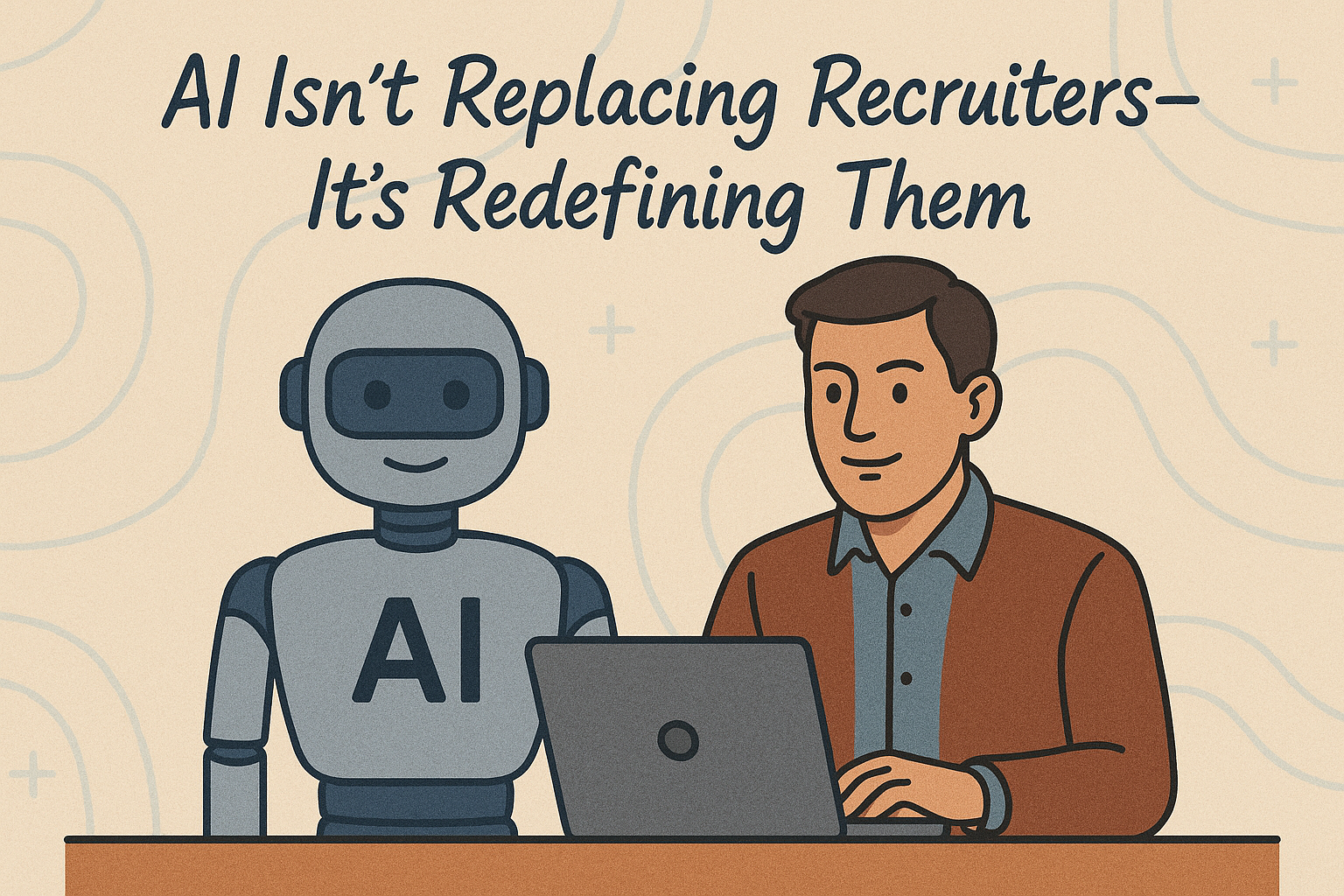In an era of rapid technological change, it’s easy to assume that when artificial intelligence enters a domain, human roles will vanish. But within talent acquisition, the reality is more nuanced. Rather than rendering human recruiters obsolete, AI is reshaping what recruiters do and how they do it. Far from being replaced, recruiters are being redefined.
In this article, we explore how AI is being integrated into hiring processes, the changes it brings, and how recruiters can thrive in this new paradigm.
The Rise of AI in Recruitment
AI has moved from optional to mainstream in recruiting.
- The global market for AI in recruitment is projected to grow from around $661.5 million in 2024 to over $1.1 billion by 2030.
- Studies show that 87% of companies already use AI‐powered recruitment tools.
- Boston Consulting Group reports that 70% of firms experimenting with AI or generative AI are doing so in HR — and talent acquisition is the top use case.
These numbers demonstrate the shift: AI is no longer just a nice-to-have; it’s becoming foundational to how organizations hire.
Where AI Takes Over—Routine & Administrative Work
One of the clearest ways AI is reshaping recruiting is by automating repetitive, time-consuming tasks:
- Candidate sourcing: AI tools scan job boards, social media, and databases to find potential fits faster.
- Resume parsing: Systems automatically extract key information from resumes and match them to job descriptions.
- Scheduling interviews: Chatbots and scheduling assistants handle coordination that used to eat up hours of recruiter time.
- Initial screening: AI can handle early-stage assessments or filter out candidates who don’t meet minimum criteria.
By off-loading these tasks, recruiters are freed from the “transactional” parts of the job.
The Human Dimension: What Recruiters Still Own
If AI is taking over routine work, what remains uniquely human? Here are key areas:
Relationship & Candidate Experience
Recruiters now have more head-space to build relationships, understand candidate motivations, culture fit, and act as trusted advisors. AI may scan a resume—but it cannot emulate empathy, coaching, or personalized human connection.
Strategy & Talent-Branding
Human recruiters will increasingly focus on understanding business strategy, employer brand, talent pipelines, and workforce planning. They will shape how AI tools are deployed to create value, rather than simply execute tasks.
Complex Decision-Making & Judgment
While AI might highlight a candidate, humans still must interpret nuances:
- Will this person thrive in our culture?
- Can they grow into that role?
- What unique value do they bring that the algorithm might not capture?
As one expert put it: “AI handles the what. Humans still own the why.”
The New Role of the “Recruiter + AI” Partner
The most successful recruiters become hybrid professionals—fluent in technology and human dynamics. They understand:
- How to interpret AI outputs and use them as input into human judgment.
- How to evaluate AI tools for bias, fairness, and transparency.
- How to design recruitment workflows where AI and humans complement each other rather than compete.
In practice this might look like: using AI to identify 50 strong potential candidates in minutes, then the recruiter stepping in to develop relationships with top 5, assess culture fit, and present a short-list of not just “technically qualified” but “organizationally ready” people.
Benefits — And A Few Cautions
Benefits
- Speed & efficiency: Organizations report substantially faster time-to-hire when using AI tools.
- Better candidate sourcing & cost reduction: Many recruiters say sourcing is the area where AI helps most.
- Potential to reduce bias and improve fairness: Some research indicates AI tools can reduce human error and bias in screening.
Cautions
- Bias & fairness risks: If AI is trained on biased data, it may perpetuate or amplify bias.
- Candidate trust and transparency: Some job-seekers dislike being screened or interviewed by “robots.”
- Over-automation risk: If recruiters rely too heavily on AI, the human touch may be lost—impacting candidate experience or cultural fit.
What This Means for Recruiters Today
If you are a recruiter (or work in talent acquisition), here are actionable steps:
- Get comfortable with AI tools: understanding how they work, what they output, and their limitations.
- Focus on your uniquely human skills: communication, relationship-building, consulting, and talent strategy.
- Think of yourself as a human-in-the-loop: You harness AI to do more, not less.
- Advocate for ethical use of AI within your organization: ensure fairness, transparency, and candidate dignity.
- Stay curious: As AI evolves, so will your role. Adaptability will be a core strength.
Final Takeaway
For recruiters, the message is clear: adapt or be outpaced. AI will continue to reshape recruitment — but rather than respond with fear of replacement, the smarter play is to lean into evolution. By embracing AI as a tool, you can elevate your role: more strategic, more human, and ultimately more impactful.
FAQ
Q: Will AI replace all recruiters eventually?
A: Unlikely in the near-to-mid term. While AI can automate many tasks, the human elements of talent engagement, judgement, culture-fit assessment, and strategic talent planning are not easily replaced. The future is about exceptional recruiters who effectively leverage AI.
Q: What skills should recruiters build now?
A: Digital literacy, data interpretation, candidate relationship management, strategic workforce planning, employer branding, and coaching are key areas for growth.
Q: How should organizations approach AI in recruitment responsibly?
A: Choose tools with fairness and transparency features, audit for bias, keep humans in key decision loops, and communicate clearly to candidates how AI is used.
Sources
- SmartRecruiters (2024) — “Recruitment Statistics on AI for 2024”
- DemandSage (2024) — “AI Recruitment Statistics”
- Boston Consulting Group (2025) — “How AI Is Changing Recruitment”
- The Principal Recruiter (2025) — “AI for Recruiters in 2025: What Gets Automated, What Stays Human”
- WiFi Talents (2024) — “AI in the Recruitment Industry Statistics”
- Millman Search Group (2024) — “AI in Recruitment: Best Practices”
- arXiv.org (2024) — “Bias, Fairness, and Transparency in AI Recruitment Models”

